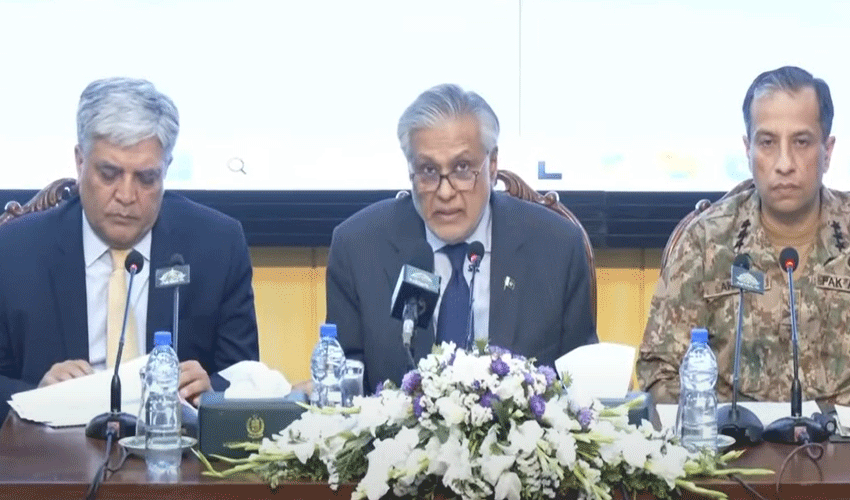Chief of Army Staff (COAS) General Syed Asim Munir met with Karachi's business community during his visit to the city, where he discussed critical economic issues and the ongoing efforts to strengthen Pakistan’s economy.
Speaking to the business leaders, General Asim Munir said: "A year ago, I told you all not to despair, as despair is a sin. Never give up hope for the prosperity of Pakistan," adding that collective efforts have helped defeat attempts to create hopelessness within society.
He highlighted Pakistan's exceptional abilities across various sectors, reiterating that the country seeks to secure its rightful place on the global stage through its own resources and capabilities. He also noted the positive effects of successfully controlling smuggling along Pakistan's western border that have benefited the economy.
General Munir also commended the role of Pakistan’s international allies, particularly China, Saudi Arabia, and the United Arab Emirates, for their contributions to the country's economic recovery. He noted that major global companies were investing in Pakistan, signalling a promising future for the nation’s economy.
"Google, Starlink and other international companies are investing in Pakistan," the army chief announced.
Gen Munir underscored that these achievements would not have been possible without the support of the business community, which he encouraged to maintain its role in Pakistan’s economic development. "Everyone should have unwavering faith in the bright future of Pakistan," he remarked.
Furthermore, General Munir assured the business community in Karachi that their challenges and concerns would be addressed on priority. He reaffirmed the army's commitment to taking decisive action against illegal activities that harm the country's economic stability.
In his concluding remarks, General Munir invited the business community to join hands with the government in driving economic progress. He urged the business sector to continue its collaboration with the Special Investment Facilitation Council (SIFC) to attract further investment and promote sustainable growth.
On Friday, more than 100 prominent businessmen engaged in discussions with General Asim Munir, which lasted for four and a half hours. The session focused on pressing economic challenges and ways to stimulate business growth, with key announcements aimed at boosting the country’s economy.
The traders, in a conversation with Samaa TV, shared the positive outcomes of the meeting. They revealed that the army chief had shared “good news” regarding the country’s economic future, announcing a plan to bring down interest rates to single digits by next year.
General Munir was also said to have informed the participants that electricity prices would be reduced as early as next month. One of the key topics discussed was the repatriation of money held abroad by Pakistani traders and businesspeople. He urged them to bring back their investments to help stimulate the local economy. In response, the traders advised an "amnesty" scheme be introduced to facilitate the return of funds and encourage investment within the country.
During the meeting, General Munir encouraged the business community to prepare for new industrial ventures to strengthen the economy, and called for cooperation between the government and the private sector. He also mentioned that dialogues were ongoing with the political leadership regarding the creation of new provinces, which he believed will improve administrative efficiency and bring forth new leadership.
Reaffirming the military’s commitment to Karachi, General Asim Munir stated, “Our hearts beat for Karachi,” and stressed that the military remains dedicated to supporting the city’s development. He also highlighted that business enterprises run by the military contribute around Rs 400 billion annually to the national treasury.
During the meeting, prominent businessman Arif Habib proposed the idea of separating the construction and real estate sectors to enhance the efficiency and focus of each industry. The proposal was welcomed and discussed as part of broader measures aimed at stimulating economic growth.



























